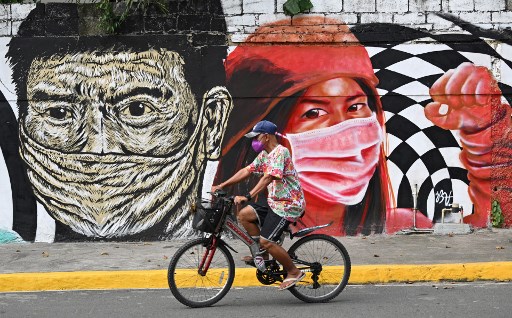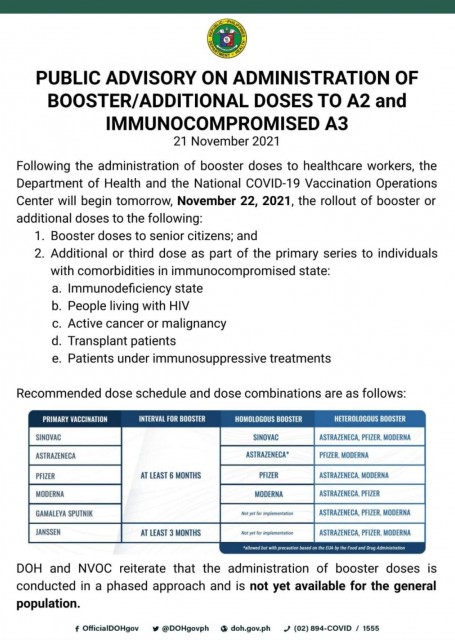Says booster doses not yet available for general population

(Eagle News) – The Department of Health (DOH) started giving COVID-19 boosters or additional doses to seniors and persons with comorbidities on Monday, Nov. 22.
This followed the administration of booster doses to health care workers which started on Nov. 17.
According to the DOH, COVID-19 vaccine boosters could be given to the elderly or the A2 sector, while an “additional or third dose as part of the primary series” could be given to “individuals with comorbidities in immunocompromised state” or the A3 priority group.
The DOH said that these individuals include those with an immunodeficiency state, people living with HIV, those with active cancer or malignancy, transplant patients, and patients under immunosuppressive treatments.
Immunosuppressive treatments refer to drugs or treatments that are used where reduction of the strength of the body’s immune system is necessary in treating certain auto-immune diseases and in addressing organ transplants.
The DOH and the National Vaccine Operations Center stressed that “the administration of booster doses” would be conducted in a “phased approach” and “is not yet available for the general population.”
-Boosters and suggested combination of add’l doses by DOH-
According to the DOH, those given Sinovac, AstraZeneca, Pfizer, and Moderna as primary doses (as first and second vaccine doses), should be given a booster at least six months after the second primary dose. Homologous boosters can be used, meaning the same vaccine brand or type will be administered.
In case of heterologous boosters, those who received Sinovac primary doses can receive any of these three vaccines as a booster shot – AstraZeneca, Pfizer and Moderna.
Those who received AstraZeneca as first and second dose could receive either Pfizer or Moderna as heterologous booster dose.
Those who got Pfizer as primary dose would get either AstraZeneca or Moderna as heterologous booster; while those who got Moderna as primary dose could get either AstraZeneca or Pfizer as a heterologous booster dose.

Meanwhile, individuals who received the Gamaleya Sputnik as first and second dose (primary doses) can receive any of these three vaccines as booster dose – AstraZeneca, Pfizer and Moderna. This would be administered six months after the primary dose.
A homologous booster for Sputnik “is not yet for implementation.”
The same goes for those who got Janssen vaccines as primary dose. The homologous booster shot for this brand is still awaiting approval. Those who had Janssen vaccines as primary dose could however get as heterologous booster dose any of these three vaccines after three months – AstraZeneca, Pfizer, and Moderna.
Booster shots or additional doses are meant to give additional protection to those individuals who are most at risk for COVID-19.
(Eagle News Service)






